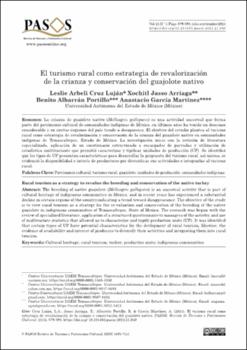El turismo rural como estrategia de revalorización de la crianza y conservación del guajolote nativo
Fecha
2023Resumen
La crianza de guajolote nativo (Melleagris gallopavo) es una actividad ancestral que forma
parte del patrimonio cultural de comunidades indígenas de México, en últimos años ha tenido un descenso
considerable y en ciertas regiones del país tiende a desaparecer. El objetivo del estudio plantea al turismo
rural como estrategia de revalorización y conservación de la crianza del guajolote nativo en comunidades
indígenas de Temascaltepec, Estado de México. La investigación inicio con la revisión de literatura
especializada, aplicación de un cuestionario estructurado a encargados de parvadas y utilización de
estadística multivariante que permitió caracterizar y tipificar unidades de producción (UP). Se identificó
que los tipos de UP presentan características para desarrollar la propuesta del turismo rural, así mismo, se
evidenció la disponibilidad e interés de productores por diversificar sus actividades e integrarlas al turismo
rural. The breeding of native guajolote (Melleagris gallopavo) is an ancestral activity that is part of
cultural heritage of indigenous communities in Mexico, and in recent years has experienced a substantial
decline in certain regions of the country,indicating a trend toward disappearance. The objective of the study
is to view rural tourism as a strategy for the re‐valuation and conservation of the breeding of the native
guajolote in indigenous communities of Temascaltepec, State of Mexico. The research was begun with the
review of specialized literature, application of a structured questionnaire to managers of the activity, and use
of multivariate statistics that allowed us to characterise and typify production units (UP). It was identified
that certain types of UP have potential characteristics for the devlopment of rural tourism, likewise, the
evidence of availability and interest of producers to diversify their activities and integrating them into rural
tourism.





